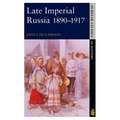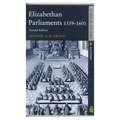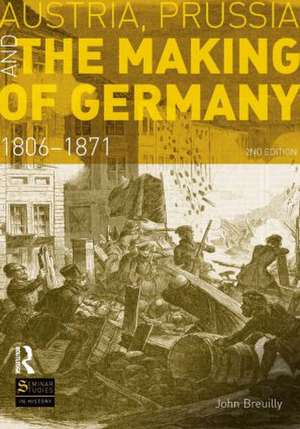Austria, Prussia and The Making of Germany: 1806-1871: Seminar Studies
Autor John Breuillyen Limba Engleză Paperback – 19 mai 2011
| Toate formatele și edițiile | Preț | Express |
|---|---|---|
| Paperback (1) | 304.42 lei 3-5 săpt. | +7.00 lei 10-14 zile |
| Taylor & Francis – 19 mai 2011 | 304.42 lei 3-5 săpt. | +7.00 lei 10-14 zile |
| Hardback (1) | 1044.77 lei 6-8 săpt. | |
| Taylor & Francis – 28 iul 2017 | 1044.77 lei 6-8 săpt. |
Din seria Seminar Studies
-
 Preț: 305.61 lei
Preț: 305.61 lei -
 Preț: 394.47 lei
Preț: 394.47 lei -
 Preț: 193.64 lei
Preț: 193.64 lei -
 Preț: 322.38 lei
Preț: 322.38 lei -
 Preț: 211.76 lei
Preț: 211.76 lei -
 Preț: 308.30 lei
Preț: 308.30 lei -
 Preț: 307.26 lei
Preț: 307.26 lei -
 Preț: 307.80 lei
Preț: 307.80 lei -
 Preț: 314.14 lei
Preț: 314.14 lei -
 Preț: 309.39 lei
Preț: 309.39 lei -
 Preț: 309.39 lei
Preț: 309.39 lei -
 Preț: 330.52 lei
Preț: 330.52 lei -
 Preț: 305.63 lei
Preț: 305.63 lei -
 Preț: 314.50 lei
Preț: 314.50 lei -
 Preț: 316.72 lei
Preț: 316.72 lei -
 Preț: 307.65 lei
Preț: 307.65 lei -
 Preț: 308.52 lei
Preț: 308.52 lei -
 Preț: 307.27 lei
Preț: 307.27 lei -
 Preț: 299.85 lei
Preț: 299.85 lei -
 Preț: 314.14 lei
Preț: 314.14 lei -
 Preț: 306.94 lei
Preț: 306.94 lei -
 Preț: 314.42 lei
Preț: 314.42 lei -
 Preț: 402.80 lei
Preț: 402.80 lei -
 Preț: 305.90 lei
Preț: 305.90 lei -
 Preț: 346.51 lei
Preț: 346.51 lei -
 Preț: 310.45 lei
Preț: 310.45 lei -
 Preț: 306.00 lei
Preț: 306.00 lei -
 Preț: 306.39 lei
Preț: 306.39 lei -
 Preț: 306.39 lei
Preț: 306.39 lei -
 Preț: 349.57 lei
Preț: 349.57 lei -
 Preț: 306.06 lei
Preț: 306.06 lei -
 Preț: 314.03 lei
Preț: 314.03 lei -
 Preț: 332.21 lei
Preț: 332.21 lei -
 Preț: 306.29 lei
Preț: 306.29 lei -
 Preț: 308.52 lei
Preț: 308.52 lei -
 Preț: 204.23 lei
Preț: 204.23 lei -
 Preț: 307.93 lei
Preț: 307.93 lei -
 Preț: 306.29 lei
Preț: 306.29 lei -
 Preț: 427.54 lei
Preț: 427.54 lei -
 Preț: 316.55 lei
Preț: 316.55 lei -
 Preț: 330.10 lei
Preț: 330.10 lei -
 Preț: 266.29 lei
Preț: 266.29 lei -
 Preț: 305.47 lei
Preț: 305.47 lei -
 Preț: 348.97 lei
Preț: 348.97 lei -
 Preț: 308.91 lei
Preț: 308.91 lei -
 Preț: 308.03 lei
Preț: 308.03 lei -
 Preț: 307.93 lei
Preț: 307.93 lei -
 Preț: 305.97 lei
Preț: 305.97 lei -
 Preț: 305.90 lei
Preț: 305.90 lei
Preț: 304.42 lei
Nou
Puncte Express: 457
Preț estimativ în valută:
58.25€ • 60.98$ • 48.20£
58.25€ • 60.98$ • 48.20£
Carte disponibilă
Livrare economică 15-29 martie
Livrare express 04-08 martie pentru 16.99 lei
Preluare comenzi: 021 569.72.76
Specificații
ISBN-13: 9781408272763
ISBN-10: 1408272768
Pagini: 232
Dimensiuni: 170 x 240 x 15 mm
Greutate: 0.04 kg
Ediția:2Revizuită
Editura: Taylor & Francis
Colecția Routledge
Seria Seminar Studies
Locul publicării:Oxford, United Kingdom
ISBN-10: 1408272768
Pagini: 232
Dimensiuni: 170 x 240 x 15 mm
Greutate: 0.04 kg
Ediția:2Revizuită
Editura: Taylor & Francis
Colecția Routledge
Seria Seminar Studies
Locul publicării:Oxford, United Kingdom
Notă biografică
John Breuilly is Professor of Nationalism and Ethnicity at the London School of Economics. His other publications in this field include The Formation of the First German Nation-State (1996) and, with Ronald Speirs (eds), Germany’s Two Unifications: Anticipations, Experiences, Responses (2004). He is currently editing The Oxford Handbook of the History of Nationalism.
Cuprins
Part One: Analysis. 1 Introduction. 2 From defeat to triumph, 1806-1815. 3 Cooperative Domination, 1815-48. 4 Austria and Prussia lose control, 1848-1849. 5 Counter-revolution, Cooperation and Conflict, 1849-1858. 6 From Cooperation to War, 1858-1866. 7 The Definitive Exclusion of Austria from Germany, 1867-1871. 8 Comparing Austria and Prussia. 9 Conclusion. Part Two: Documents. 1 End of Empire and formation of Rheinbund. 2 Peace of Tilsit between France and Prussia, 9 July 1807. 3 ‘A good revolution’: Hardenberg’s Riga Memorandum. 4 Peace of Schönbrunn between France and Austria, 14 October 1809. 5 Stein to Count Münster, 1 December 1812. 6 Convention of Tauroggen, 30 December 1812. 7 Ernst Moritz Arndt: ‘To the Prussians!’, January 1813. 8 Prussian introduction of universal conscription. 9 Frederick William III: ‘An Mein Volk’, 17 March 1813. 10 Kalisch Declaration of March 1813. 11 Metternich’s interview with Napoleon, Dresden, 16 June 1813. 12 Military forces at the Battle of Leipzig, October 1813. 13 Frederick William III promises a constitution, 22 May 1815. 14 German Confederal Act, 8 June 1815. 15 Vienna Final Act, 15 May 1820. 16 Petition for a single customs system, April 1819. 17 Customs union agreement between Prussia and the Grand Duchy of Hesse, February 1828. 18 Memorandum of Prussian Finance Minister Friedrich von Motz, 1829. 19 Metternich’s reaction to Prussian customs union policy, June 1831. 20 Prussia extends its influence through customs agreements, November 1831. 21 Paul Pfizer: On the aims and tasks of German liberalism, Tübingen, 1832. 22 &
Descriere
It is often argued that the unification of Germany in 1871 was the inevitable result of the convergence of Prussian power and German nationalism. John Breuilly here shows that the true story was much more complex. For most of the nineteenth century Austria was the dominant power in the region. Prussian-led unification was highly unlikely up until the 1860s and even then was only possible because of the many other changes happening in Germany, Europe and the wider world.














